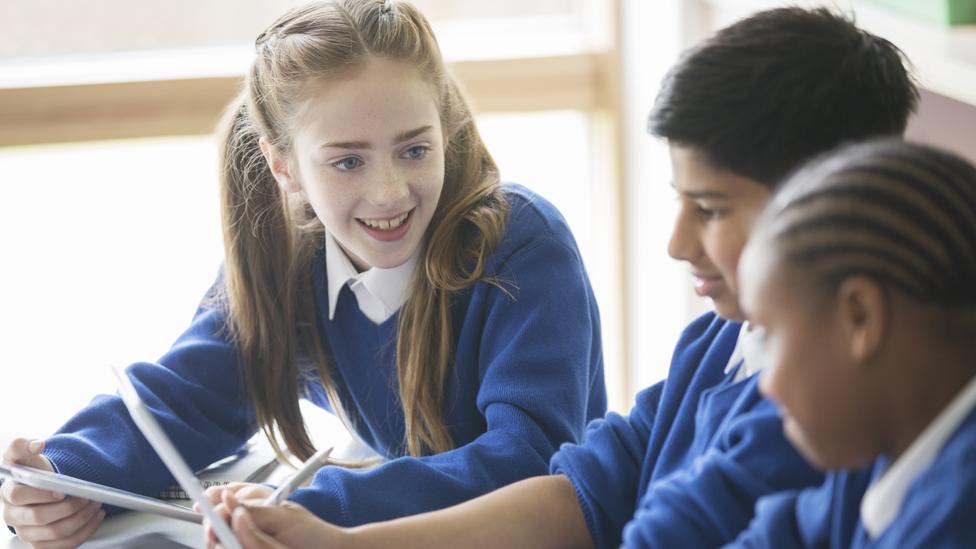Teachers in southern England walk out in second day of strike action
- Published

Teachers at Poole High School walked out as part of the industrial action
Schools across the south of England are facing disruption as teachers take a second day of strike action.
The National Education Union (NEU) is demanding above-inflation pay rises, not funded from existing budgets.
Many headteachers have opted to keep schools partially open, while others decided to close for the day.
The government is offering "formal talks on pay, conditions and reform" if the strike action is called off.
Allow X content?
This article contains content provided by X. We ask for your permission before anything is loaded, as they may be using cookies and other technologies. You may want to read X’s cookie policy, external and privacy policy, external before accepting. To view this content choose ‘accept and continue’.
More than half of schools in England closed or partially shut during the first NEU strike on 1 February.
Thursday's action in the south-east and south-west of England follows walkouts by teachers elsewhere in the country on Tuesday and Wednesday.
At Poole High School in Dorset, Year 11 students taking their mock exams went into school while other year groups had to stay at home.
On the picket line, history and politics teacher Lucy Ryall said: "The workload is untenable, the funding's just not good enough so many of my colleagues have now left the profession.
"In my department there is not a textbook per child - we simply cannot afford to buy them.
"We are held together by a lot of goodwill - when you go inside schools we are walking towards catastrophe - I don't think the government see or care enough about that."
Allow X content?
This article contains content provided by X. We ask for your permission before anything is loaded, as they may be using cookies and other technologies. You may want to read X’s cookie policy, external and privacy policy, external before accepting. To view this content choose ‘accept and continue’.
Chemistry teacher Nick Jarvis said: "I think the government need to put a firm offer on the table before the unions are in a position to call off the action - I really hope so, we want to be back in our classrooms teaching students. It's what we love doing."
In Reading, Katie Gumbrell, a teacher at Hill Primary School, was asked her response to parents disrupted by children being unable to attend school.
"I'd say sorry - our action is not against them, it's against the government. They should be asking how many classes are being taught by unqualified teachers? They should be asking the questions and work out where their anger needs to be directed.
"There's been no reward for those teachers who worked so hard during Covid, no reward for experience in the classrooms and we know the profession is haemorrhaging teachers," she said.

NEU members held a rally in Forbury Gardens in Reading
Ben Habbershaw, a striking teacher at Windmill Primary in Headington, Oxfordshire, said there had been a "gradual creep" on school funding.
"It's 10 years of the stripping of budgets from schools which has reached a head," he said.
"Spend a bit of money now and we produce two or three generations of children who are highly skilled, brilliant learners and people - we are finding it more difficult to do that in this climate."

Ben Habbersahw said many parents supported the teachers' action
The government is proposing a 3% pay rise for most teachers in 2023/24.
Education Secretary Gillian Keegan said it was "hugely disappointing" the strike action was continuing and called on teachers to follow the example of the Royal College of Nursing (RCN) and enter pay talks.
"The government made a serious offer to pause strikes and get round the table and talk about all the issues that were part of the dispute," she said.
She also said the government has already agreed to provide an extra £2bn in school funding in England, "which will take real-terms spending on schools to its highest level in history".
The NEU said it would only pause action if progress was made in talks first. Further strikes are planned for next Wednesday and Thursday.

Are you a teacher involved in the strike action, or a parent of a pupil affected by it? Please email us: haveyoursay@bbc.co.uk, external.
Please include a contact number if you are willing to speak to a BBC journalist. You can also get in touch in the following ways:
WhatsApp: +44 7756 165803, external
Tweet: @BBC_HaveYourSay, external
Or fill out the form below
Please read our terms & conditions and privacy policy
If you are reading this page and can't see the form you will need to visit the mobile version of the BBC website to submit your question or comment or you can email us at HaveYourSay@bbc.co.uk, external. Please include your name, age and location with any submission.

Follow BBC South on Facebook, external, Twitter, external, or Instagram, external. Send your story ideas to south.newsonline@bbc.co.uk, external.
- Published15 April
